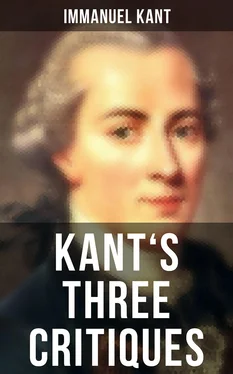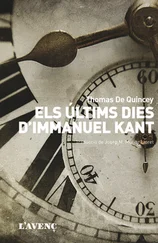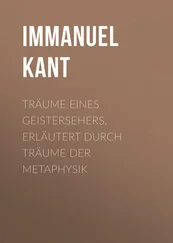But it is still more remarkable that, to understand the possibility of things according to the categories and thus to demonstrate the objective reality of the latter, we require not merely intuitions, but external intuitions. If, for example, we take the pure conceptions of relation, we find that (1) for the purpose of presenting to the conception of substance something permanent in intuition corresponding thereto and thus of demonstrating the objective reality of this conception, we require an intuition (of matter) in space, because space alone is permanent and determines things as such, while time, and with it all that is in the internal sense, is in a state of continual flow; (2) in order to represent change as the intuition corresponding to the conception of causality, we require the representation of motion as change in space; in fact, it is through it alone that changes, the possibility of which no pure understanding can perceive, are capable of being intuited. Change is the connection of determinations contradictorily opposed to each other in the existence of one and the same thing. Now, how it is possible that out of a given state one quite opposite to it in the same thing should follow, reason without an example can not only not conceive, but cannot even make intelligible without intuition; and this intuition is the motion of a point in space; the existence of which in different spaces (as a consequence of opposite determinations) alone makes the intuition of change possible. For, in order to make even internal change cognitable, we require to represent time, as the form of the internal sense, figuratively by a line, and the internal change by the drawing of that line (motion), and consequently are obliged to employ external intuition to be able to represent the successive existence of ourselves in different states. The proper ground of this fact is that all change to be perceived as change presupposes something permanent in intuition, while in the internal sense no permanent intuition is to be found. Lastly, the objective possibility of the category of community cannot be conceived by mere reason, and consequently its objective reality cannot be demonstrated without an intuition, and that external in space. For how can we conceive the possibility of community, that is, when several substances exist, that some effect on the existence of the one follows from the existence of the other, and reciprocally, and therefore that, because something exists in the latter, something else must exist in the former, which could not be understood from its own existence alone? For this is the very essence of community — which is inconceivable as a property of things which are perfectly isolated. Hence, Leibnitz, in attributing to the substances of the world — as cogitated by the understanding alone — a community, required the mediating aid of a divinity; for, from their existence, such a property seemed to him with justice inconceivable. But we can very easily conceive the possibility of community (of substances as phenomena) if we represent them to ourselves as in space, consequently in external intuition. For external intuition contains in itself a priori formal external relations, as the conditions of the possibility of the real relations of action and reaction, and therefore of the possibility of community. With the same ease can it be demonstrated, that the possibility of things as quantities, and consequently the objective reality of the category of quantity, can be grounded only in external intuition, and that by its means alone is the notion of quantity appropriated by the internal sense. But I must avoid prolixity, and leave the task of illustrating this by examples to the reader’s own reflection.
The above remarks are of the greatest importance, not only for the confirmation of our previous confutation of idealism, but still more when the subject of self-cognition by mere internal consciousness and the determination of our own nature without the aid of external empirical intuitions is under discussion, for the indication of the grounds of the possibility of such a cognition.
The result of the whole of this part of the analytic of principles is, therefore: “All principles of the pure understanding are nothing more than a priori principles of the possibility of experience, and to experience alone do all a priori synthetical propositions apply and relate”; indeed, their possibility itself rests entirely on this relation.
29 All combination (conjunctio) is either composition (compositio) or connection (nexus). The former is the synthesis of a manifold, the parts of which do not necessarily belong to each other. For example, the two triangles into which a square is divided by a diagonal, do not necessarily belong to each other, and of this kind is the synthesis of the homogeneous in everything that can be mathematically considered. This synthesis can be divided into those of aggregation and coalition, the former of which is applied to extensive, the latter to intensive quantities. The second sort of combination (nexus) is the synthesis of a manifold, in so far as its parts do belong necessarily to each other; for example, the accident to a substance, or the effect to the cause. Consequently it is a synthesis of that which though heterogeneous, is represented as connected a priori . This combination — not an arbitrary one — I entitle dynamical because it concerns the connection of the existence of the manifold. This, again, may be divided into the physical synthesis, of the phenomena divided among each other, and the metaphysical synthesis, or the connection of phenomena a priori in the faculty of cognition.
30 [Persius. Satirae, iii.83-84. “Nothing can be produced from nothing; nothing can be returned into nothing.”]
31 It must be remarked that I do not speak of the change of certain relations, but of the change of the state. Thus, when a body moves in a uniform manner, it does not change its state (of motion); but only when all motion increases or decreases.
32 German.
33 The unity of the universe, in which all phenomena to be connected, is evidently a mere consequence of the admitted principle of the community of all substances which are coexistent. For were substances isolated, they could not as parts constitute a whole, and were their connection (reciprocal action of the manifold) not necessary from the very fact of coexistence, we could not conclude from the fact of the latter as a merely ideal relation to the former as a real one. We have, however, shown in its place that community is the proper ground of the possibility of an empirical cognition of coexistence, and that we may therefore properly reason from the latter to the former as its condition.
34 The immediate consciousness of the existence of external things is, in the preceding theorem, not presupposed, but proved, by the possibility of this consciousness understood by us or not. The question as to the possibility of it would stand thus: “Have we an internal sense, but no external sense, and is our belief in external perception a mere delusion?” But it is evident that, in order merely to fancy to ourselves anything as external, that is, to present it to the sense in intuition we must already possess an external sense, and must thereby distinguish immediately the mere receptivity of an external intuition from the spontaneity which characterizes every act of imagination. For merely to imagine also an external sense, would annihilate the faculty of intuition itself which is to be determined by the imagination.
35 When I think the reality of a thing, I do really think more than the possibility, but not in the thing; for that can never contain more in reality than was contained in its complete possibility. But while the notion of possibility is merely the notion of a position of thing in relation to the understanding (its empirical use), reality is the conjunction of the thing with perception.
Читать дальше












